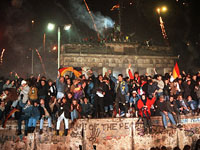World Celebrates Berlin Wall's Fall
World leaders past and present gathered in the German capital on Monday to celebrate the 20th anniversary of the Berlin Wall's fall, which led to German reunification and hastened the demise of the Soviet Union.

Images of the historic night of November 9, 1989, when East Berliners trapped behind the 3.6 meter (12 feet) high concrete barrier rushed checkpoints to force it open, have dominated German television and newspaper coverage for the past week.
As part of Monday's celebrations, 1,000 giant painted dominoes have been set up along a 1.5 km (0.9 mile) stretch of the Wall's original path next to the Brandenburg Gate.
They will be toppled on Monday evening in the presence of visiting leaders from Britain, France and Russia, in a symbolic re-enactment of a day that shook the world.
U.S. Secretary of State Hillary Clinton is also in Berlin and on Monday she met Chancellor Angela Merkel, the first German leader to have grown up behind the Wall in communist East Germany.
Merkel, who was working as a scientific researcher in East Berlin 20 years ago, has called the fall of the Wall "the happiest day in recent Germany history."
The Berlin Wall stood for nearly three decades, the most potent symbol of Cold War divisions. Its collapse helped herald the wider collapse of communism across eastern Europe.
The East began construction of the barrier on Aug. 13, 1961 in an attempt to stop the flight of people to the West.
By 1989, the wall stretched nearly 100 miles (155 kilometers) around West Berlin, including 30 miles (43 kilometers) through the city itself. Nearly 12 feet (3.6 meters) high in places, the barrier featured hundreds of watch towers, miles (kilometers) of anti-vehicle trenches, bunkers, barbed wire, signal fences and other obstacles.
With some people, the 1990 reunification of the country remains a sore point. A poll of over 1,000 Germans for the Leipziger Volkszeitung daily showed one in eight wanted the Wall rebuilt -- with the numbers nearly equal in East and West.
Thousands of tourists have poured into Berlin to mark the event. Figures from the era that ushered in the collapse of communism in eastern Europe, including ex-Soviet leader Mikhail Gorbachev and Polish Solidarity union leader Lech Walesa, are also taking part in commemorations.
Gorbachev, ex-chancellor Helmut Kohl and former U.S. President George Bush Senior, who led their respective countries in November 1989, appeared in a double page newspaper advertisement in Germany.
"No wall is ever strong enough to strangle the human spirit," Bush said in a comment alongside a photo of the three.
Reuters has contributed to the report.
Subscribe to Pravda.Ru Telegram channel, Facebook, RSS!





